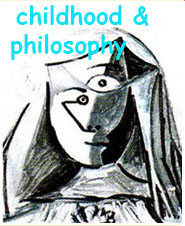"infancy and puberty" in greek calends. a phenomenological interpretation of arrival
DOI:
https://doi.org/10.12957/childphilo.2017.25217Keywords:
Infancia, filosofía, formaciónAbstract
"Greek Calends". Sicilian writer GesualdoBufalino’s book is dedicated to the practice of memories, that returning to one’s self, that coming back, even on that which we cannot remember, that is to say, the starting point, our birth; that same beginning which is common to all of us but which no one is able to remember. A beginning which we evoke just according to births we have witnessed, of course, always on the side of he who awaits, he who waits, anxiously, the arrival of a newcomer, of an infant. And it is with this very initial experience that is dealt in this article by means of categories such as passivity and activity in Edmund Husserl, German philosopher from which, I plunge with hermeneutist aims into the first chapter of Bufalino’s book: “infancy and puberty” in order to, not only, glorify, the sublime literary recreation the Italian writer makes on the experience of being born, but also to show how the human pup, that means, the newcomer, would pass from he himself as I, still undifferentiated, not divided, towards the I to himself, becoming, this way, “free” to take position and, consequently, to decide on himself, as a subject becoming in the time.Downloads
Download data is not yet available.
Downloads
Published
2017-01-09
Issue
Section
articles



